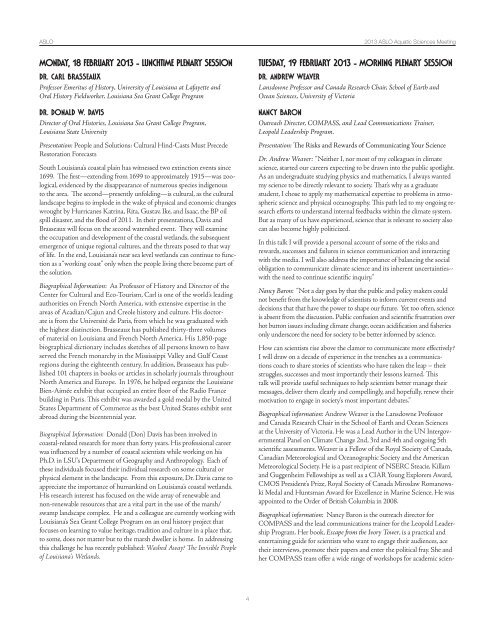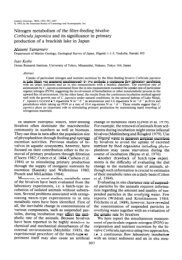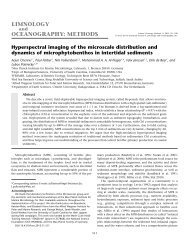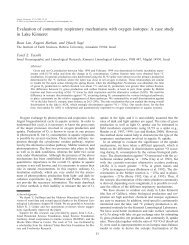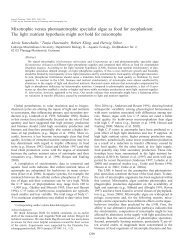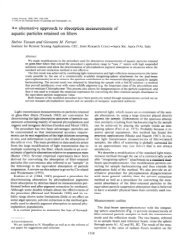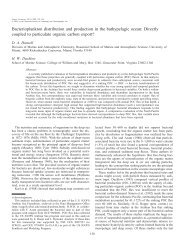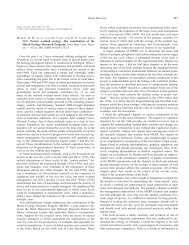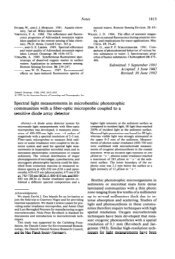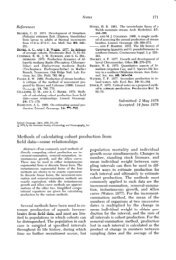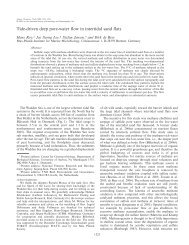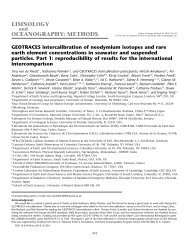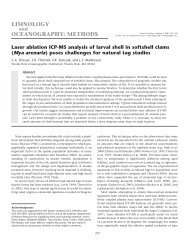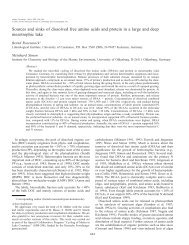CONFERENCE PROGRAM - ASLO
CONFERENCE PROGRAM - ASLO
CONFERENCE PROGRAM - ASLO
Create successful ePaper yourself
Turn your PDF publications into a flip-book with our unique Google optimized e-Paper software.
<strong>ASLO</strong> 2013 <strong>ASLO</strong> Aquatic Sciences Meeting<br />
MONDAY, 18 FEBRUARY 2013 – LUNCHTIME PLENARY SESSION<br />
DR. CARL BRASSEAUX<br />
Professor Emeritus of History, University of Louisiana at Lafayette and<br />
Oral History Fieldworker, Louisiana Sea Grant College Program<br />
DR. DONALD W. DAVIS<br />
Director of Oral Histories, Louisiana Sea Grant College Program,<br />
Louisiana State University<br />
Presentation: People and Solutions: Cultural Hind-Casts Must Precede<br />
Restoration Forecasts<br />
South Louisiana’s coastal plain has witnessed two extinction events since<br />
1699. The first—extending from 1699 to approximately 1915—was zoological,<br />
evidenced by the disappearance of numerous species indigenous<br />
to the area. The second—presently unfolding—is cultural, as the cultural<br />
landscape begins to implode in the wake of physical and economic changes<br />
wrought by Hurricanes Katrina, Rita, Gustav, Ike, and Isaac, the BP oil<br />
spill disaster, and the flood of 2011. In their presentations, Davis and<br />
Brasseaux will focus on the second watershed event. They will examine<br />
the occupation and development of the coastal wetlands, the subsequent<br />
emergence of unique regional cultures, and the threats posed to that way<br />
of life. In the end, Louisiana’s near sea level wetlands can continue to function<br />
as a “working coast” only when the people living there become part of<br />
the solution.<br />
Biographical Information: As Professor of History and Director of the<br />
Center for Cultural and Eco-Tourism, Carl is one of the world’s leading<br />
authorities on French North America, with extensive expertise in the<br />
areas of Acadian/Cajun and Creole history and culture. His doctorate<br />
is from the Université de Paris, from which he was graduated with<br />
the highest distinction. Brasseaux has published thirty-three volumes<br />
of material on Louisiana and French North America. His 1,850-page<br />
biographical dictionary includes sketches of all persons known to have<br />
served the French monarchy in the Mississippi Valley and Gulf Coast<br />
regions during the eighteenth century. In addition, Brasseaux has published<br />
101 chapters in books or articles in scholarly journals throughout<br />
North America and Europe. In 1976, he helped organize the Louisiane<br />
Bien-Aimée exhibit that occupied an entire floor of the Radio France<br />
building in Paris. This exhibit was awarded a gold medal by the United<br />
States Department of Commerce as the best United States exhibit sent<br />
abroad during the bicentennial year.<br />
Biographical Information: Donald (Don) Davis has been involved in<br />
coastal-related research for more than forty years. His professional career<br />
was influenced by a number of coastal scientists while working on his<br />
Ph.D. in LSU’s Department of Geography and Anthropology. Each of<br />
these individuals focused their individual research on some cultural or<br />
physical element in the landscape. From this exposure, Dr. Davis came to<br />
appreciate the importance of humankind on Louisiana’s coastal wetlands.<br />
His research interest has focused on the wide array of renewable and<br />
non-renewable resources that are a vital part in the use of the marsh/<br />
swamp landscape complex. He and a colleague are currently working with<br />
Louisiana’s Sea Grant College Program on an oral history project that<br />
focuses on learning to value heritage, tradition and culture in a place that,<br />
to some, does not matter but to the marsh dweller is home. In addressing<br />
this challenge he has recently published: Washed Away? The Invisible People<br />
of Louisiana’s Wetlands.<br />
4<br />
TUESDAY, 19 FEBRUARY 2013 – MORNING PLENARY SESSION<br />
DR. ANDREW WEAVER<br />
Lansdowne Professor and Canada Research Chair, School of Earth and<br />
Ocean Sciences, University of Victoria<br />
NANCY BARON<br />
Outreach Director, COMPASS, and Lead Communications Trainer,<br />
Leopold Leadership Program.<br />
Presentation: The Risks and Rewards of Communicating Your Science<br />
Dr. Andrew Weaver: “Neither I, nor most of my colleagues in climate<br />
science, started our careers expecting to be drawn into the public spotlight.<br />
As an undergraduate studying physics and mathematics, I always wanted<br />
my science to be directly relevant to society. That’s why as a graduate<br />
student, I chose to apply my mathematical expertise to problems in atmospheric<br />
science and physical oceanography. This path led to my ongoing research<br />
efforts to understand internal feedbacks within the climate system.<br />
But as many of us have experienced, science that is relevant to society also<br />
can also become highly politicized.<br />
In this talk I will provide a personal account of some of the risks and<br />
rewards, successes and failures in science communication and interacting<br />
with the media. I will also address the importance of balancing the social<br />
obligation to communicate climate science and its inherent uncertainties--<br />
with the need to continue scientific inquiry.”<br />
Nancy Baron: “Not a day goes by that the public and policy makers could<br />
not benefit from the knowledge of scientists to inform current events and<br />
decisions that that have the power to shape our future. Yet too often, science<br />
is absent from the discussion. Public confusion and scientific frustration over<br />
hot button issues including climate change, ocean acidification and fisheries<br />
only underscore the need for society to be better informed by science.<br />
How can scientists rise above the clamor to communicate more effectively?<br />
I will draw on a decade of experience in the trenches as a communications<br />
coach to share stories of scientists who have taken the leap – their<br />
struggles, successes and most importantly their lessons learned. This<br />
talk will provide useful techniques to help scientists better manage their<br />
messages, deliver them clearly and compellingly, and hopefully, renew their<br />
motivation to engage in society’s most important debates.”<br />
Biographical information: Andrew Weaver is the Lansdowne Professor<br />
and Canada Research Chair in the School of Earth and Ocean Sciences<br />
at the University of Victoria. He was a Lead Author in the UN Intergovernmental<br />
Panel on Climate Change 2nd, 3rd and 4th and ongoing 5th<br />
scientific assessments. Weaver is a Fellow of the Royal Society of Canada,<br />
Canadian Meteorological and Oceanographic Society and the American<br />
Meteorological Society. He is a past recipient of NSERC Steacie, Killam<br />
and Guggenheim Fellowships as well as a CIAR Young Explorers Award,<br />
CMOS President’s Prize, Royal Society of Canada Miroslaw Romanowski<br />
Medal and Huntsman Award for Excellence in Marine Science. He was<br />
appointed to the Order of British Columbia in 2008.<br />
Biographical information: Nancy Baron is the outreach director for<br />
COMPASS and the lead communications trainer for the Leopold Leadership<br />
Program. Her book, Escape from the Ivory Tower, is a practical and<br />
entertaining guide for scientists who want to engage their audiences, ace<br />
their interviews, promote their papers and enter the political fray. She and<br />
her COMPASS team offer a wide range of workshops for academic scien-


